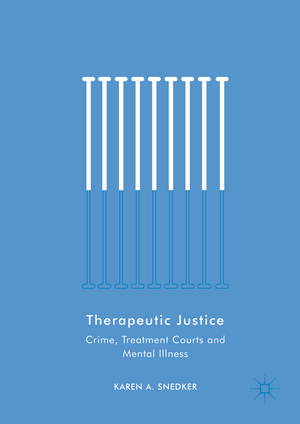Therapeutic Justice: Crime, Treatment Courts and Mental Illness
Autor Karen A. Snedkeren Limba Engleză Hardback – 29 iun 2018
| Toate formatele și edițiile | Preț | Express |
|---|---|---|
| Paperback (1) | 265.61 lei 6-8 săpt. | |
| Springer International Publishing – 29 dec 2018 | 265.61 lei 6-8 săpt. | |
| Hardback (1) | 1201.98 lei 6-8 săpt. | |
| Springer International Publishing – 29 iun 2018 | 1201.98 lei 6-8 săpt. |
Preț: 1201.98 lei
Preț vechi: 1465.83 lei
-18% Nou
Puncte Express: 1803
Preț estimativ în valută:
230.10€ • 236.65$ • 190.90£
230.10€ • 236.65$ • 190.90£
Carte tipărită la comandă
Livrare economică 17 februarie-03 martie
Preluare comenzi: 021 569.72.76
Specificații
ISBN-13: 9783319789019
ISBN-10: 3319789015
Pagini: 332
Ilustrații: XXI, 329 p. 2 illus.
Dimensiuni: 148 x 210 mm
Greutate: 0.59 kg
Ediția:1st ed. 2018
Editura: Springer International Publishing
Colecția Palgrave Macmillan
Locul publicării:Cham, Switzerland
ISBN-10: 3319789015
Pagini: 332
Ilustrații: XXI, 329 p. 2 illus.
Dimensiuni: 148 x 210 mm
Greutate: 0.59 kg
Ediția:1st ed. 2018
Editura: Springer International Publishing
Colecția Palgrave Macmillan
Locul publicării:Cham, Switzerland
Cuprins
Chapter 1. Mental Health Courts as the 'New Generation' of Problem-Solving Courts.- Chapter 2. Beyond Adversarialism? Collaboration and Therapeutic Goals.- Chapter 3. Clients and Therapeutic Agents: Court Selection and Team Dynamics.- Chapter 4. Therapeutic Justice in Action: Court Process, Reviews and Sanctions.- Chapter 5. Reducing Recidivism and Pathways to Success.- Chapter 6. Stories from Clients: How Mental Health Courts Can Change Lives.- Chapter 7. Conclusion: From Therapeutic Justice to Social Work Criminal Justice.
Recenzii
“Snedker’s qualitative study is a wonderful contribution to the emergent scholarship on empirically testing law’s potential as a therapeutic agent. … the book points to the immense value of qualitative methods of inquiry for examining mental health courts, and courts more generally. I hope the book inspires others to ethnographically discover the social worlds of problem-solving court professionals and participants” (Ursula Castellano, Contemporary Sociology, Vol. 49 (3), 2020)
“The book is beneficial in the area of contemporary mental health courts, therapeutic jurisprudence, and criminal justice reform. Therapeutic Justice is a wonderful read for all people vested in better understanding the intersection of mental health and the criminal justice system. Summing Up: Recommended. Graduate students through faculty.” (M. G. Urbina, Choice, Vol. 56 (05), January, 2019)
Notă biografică
Karen A. Snedker is Associate Professor of Sociology at Seattle Pacific University, USA. She is also Clinical Assistant Professor in the School of Nursing, Affiliate Faculty in Sociology and a CSDE Research Affiliate at the University of Washington, USA. Her research interests focus on mental health, homelessness, crime and violence and neighbourhood effects, and she has published widely on these topics.
Textul de pe ultima copertă
This book examines Mental Health Courts (MHC) within a socio-legal framework. Placing these courts within broader trends in criminal justice, especially problem-solving courts, the author draws from two case studies with a mixed-methods design. While court observational and interview data highlight the role of rituals and procedural justice in the practices of the court, quantitative data demonstrates the impact of incentives, mental health treatment compliance and graduating patterns from MHC in altering patterns of criminal recidivism. In utilising these methods, this book provides a new understanding of the social processes by which MHCs operate, while narrative stories from MHC participants illustrate both the potential and limitations of these courts. Concluding by charting potential improvements for the functioning and effectiveness of MHCs, the author suggests potential reforms and ‘best practices’ for the future in tandem with rigorous analysis. This book will be of value and interest to students and scholars of criminology, law, and social work, as well as practitioners.
Caracteristici
Offers a unique, mixed methodological qualitative and quantitative analysis of mental health courts Makes recommendations for reform and offers insights about the future of mental health courts Provides a nuanced understanding of how mental health courts work for both court actors and clients
